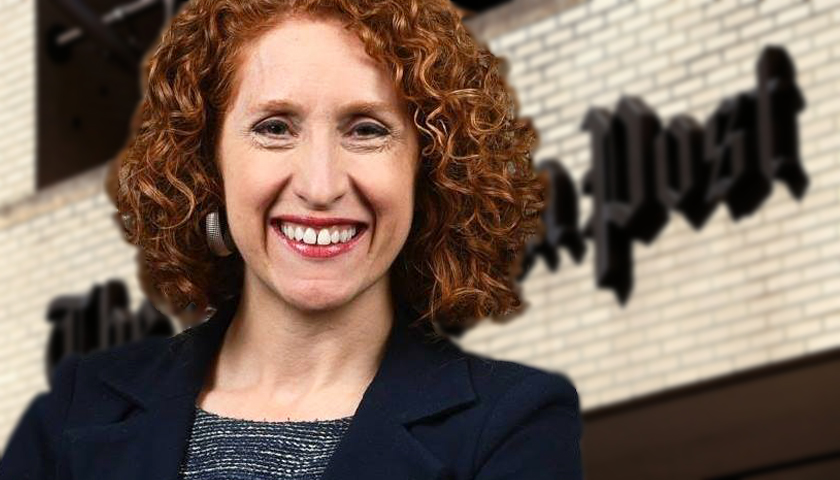by Paul Sperry
The Washington Post has recused its new national editor, Matea Gold, from the news organization’s coverage of the FBI and Justice Department over a personal conflict of interest. A month before Gold was promoted, her husband, Jonathan Lenzner, was named FBI chief of staff.
A Post spokeswoman told RealClearInvestigations that the paper’s managing editor, Steven Ginsberg, will be overseeing coverage of the Justice Department and the FBI. Kristine Coratti Kelly, the paper’s chief communications officer, said the decision does not reflect on Gold’s objectivity or credibility.
“We have every confidence in Matea’s professionalism and high standards,” Kelly said. “She has recused herself from this area of coverage to avoid even the appearance of partiality.”
The recusal means that, among other national stories, Gold will be cordoned off from guiding Post coverage of Special Counsel John Durham’s ongoing criminal investigation of the origins of the Russia probe of Donald Trump, which the FBI and Justice Department initially opened under the Obama administration.
Durham’s office secured the conviction of a top FBI lawyer last year and in recent months has indicted a top Hillary Clinton campaign lawyer and a campaign subcontractor who provided most of the information in the discredited Steele dossier, which the FBI used to buttress its investigations of Trump and his advisers. In her previous role as investigations editor, Gold helped oversee the Post’s coverage of the Russia “collusion” accusations against Trump and his advisers, including former National Security Adviser Michael Flynn.
“For the last four years, Matea has served as the national political enterprise and investigations editor, running some of The Post’s most sensitive stories, including coverage of the Russia investigation, the Ukraine pressure campaign and President Donald Trump’s attempt to subvert the 2020 election results,” the Post said in a story last week about her promotion. “Reporters and other editors gravitate to Matea for guidance and direction.”
In the wake of Durham’s findings, the Post has retracted or corrected inaccuracies in several stories about Trump and his team. Gold also will be restricted from directing coverage of the ongoing Jan. 6 investigation or editing stories about the U.S. Capitol riot probe led by FBI Director Christopher Wray and Attorney General Merrick Garland.
The conflict posed by Gold’s husband, whose family has long been allied politically with the Clintons, was discussed last week during a staff-wide Post meeting, according to sources familiar with the development.
It is not uncommon for Washington journalists to be married to government officials, lobbyists and others who influence policy from various vantage points. But a review of Gold’s biography reveals a web of especially close connections to Democratic Party officials or activists.
Gold married Lenzner in 2006. Her husband is the son of the late private investigator Terry Lenzner, who earned a reputation as President Clinton’s “private CIA” for digging up dirt on Clinton’s mistresses and other enemies. He helped squelch a series of what were internally known as “bimbo eruptions” during the 1990s, reportedly with the approval of Hillary Clinton. During the Clinton impeachment probe, Independent Counsel Kenneth Starr called him before a grand jury to testify about his aggressive investigative work on behalf of the president.
After Terry Lenzner retired in 2015, his son took over the Washington private-investigations firm he founded: Investigative Group International, or IGI. Like his father, Jon Lenzner is a Democrat and a Clinton donor; he contributed at least $1,700 to Hillary Clinton’s 2016 campaign, Federal Election Commission records show.
In December, Wray appointed Lenzner as his chief of staff. The FBI did not release a press advisory announcing the major leadership change on the seventh floor of the Hoover Building, and did not name the firm Lenzner helmed in his bio posted on the bureau’s “Leadership & Structure” page of its website. “From 2013 to 2018, Mr. Lenzner led a national risk advisory, corporate investigations, and crisis management firm in Washington, including three years as its CEO,” the bio states. Asked for more details about Wray’s decision to hire Lenzner, the FBI declined comment and would only provide a link to the same bio.
Lenzner filled the front office vacancy left by former FBI chief of staff Corey Ellis in December, after Garland appointed Ellis interim U.S. attorney for South Carolina.
In 2016, the Clinton political operation also had a sympathetic figure working on the inside of FBI headquarters — then-Deputy FBI Director Andrew McCabe — who had influence over another investigation of Hillary Clinton. McCabe took control of the FBI’s probe of Clinton’s mishandling of classified emails within months of McCabe and his wife meeting with then-Virginia Gov. Terry McAuliffe — a Democrat and longtime ally of Clinton — at the governor’s mansion in Richmond, whereupon McAuliffe agreed to bankroll the Democratic campaign of McCabe’s wife for the state senate. The FBI publicly closed the Clinton email investigation with no charges just three weeks before Clinton’s presidential nomination. Later, the Justice Department’s watchdog investigated McCabe for political conflicts related to reports he used FBI email to promote his wife’s campaign and wore a campaign T-shirt posted on social media.
IGI was the first investigative shop to launder payments for opposition research from political campaigns through law firms so that no record of payments to IGI showed up in Federal Election Commission disclosures. It first did this in 1994 while digging up dirt on then-Democratic Sen. Ted Kennedy’s opponents. In 2016, Hillary Clinton’s campaign employed a similar model in funneling more than $1 million in payments to private investigator Fusion GPS and dossier author Christopher Steele through the law firm Perkins Coie.
It’s not known if IGI did any sleuthing work for Clinton or her campaign in 2016, but the firm has investigated Trump in the past. IGI did not respond to requests for comment. IGI has a number of connections to the Clintons. Jon Lenzner’s sister, Emily Lenzner, a Biden donor who sits on IGI’s board, previously worked in the Clinton White House for Communications Director George Stephanopoulos and years later served as a production assistant for Stephanopoulos at ABC News.
After working in the White House for Hillary Clinton, Brooke Shearer, the late sister of Clinton operative Cody Shearer, took an investigative job at IGI. She was the wife of Bill Clinton’s close college friend Strobe Talbott, who sources say is a witness in Durham’s mushrooming investigation. Durham’s investigators have subpoenaed documents from the Brookings Institution, the Democratic think tank where Talbott served as president during the 2016 campaign and where the Steele dossier’s primary source, Igor Danchenko, once worked as a Russian analyst. Talbott shopped the dossier to federal agencies on behalf of Clinton. Cody Shearer worked on a second Trump-Russia dossier for Clinton during her 2016 campaign, which was pitched to the FBI as a means to corroborate the now-debunked Steele dossier.
During the Nixon impeachment hearings, Terry Lenzner served as deputy counsel on the Senate Watergate Committee. Hillary Clinton worked on the impeachment inquiry as a low-level staff attorney. After Trump won the November 2016 election, Gold participated in a PBS panel on the White House transition: “Trump Family Criticized for Conflicts of Interest.” “There’s going to be a lot of scrutiny about whether he is mixing his own business empire with his governmental actions,” Gold opined.
In September 2017, Gold shared a byline on a Post story claiming that “Trump’s divisive presidency” was costing his golf clubs and resorts gala bookings and other business. The story repeated the shorthand — and incomplete — claim that “the president said there were ‘fine people’ among white supremacists, neo-Nazis and members of the alt-right protesting to preserve a Confederate statue [of Gen. Robert E. Lee] in Charlottesville.” Actually, Trump specifically condemned white supremacists and neo-Nazis at the rally. “I’m not talking about the neo-Nazis and the white nationalists, because they should be condemned totally,” Trump stated at the time.
Although Gold has not contributed to federal political candidates, FEC records show both her parents are active Democratic donors, giving primarily to progressive candidates, including Alexandria Ocasio-Cortez. Her parents also contributed money to Howard Dean’s failed 2004 Democratic bid for president while Gold covered Dean’s candidacy as a reporter.
Gold met Lenzner on the campaign trail of former Democratic Sen. Bill Bradley’s 1999 run for the White House. Gold was covering Bradley, while Lenzner worked for him as a press aide.
– – –
Paul Sperry is an investigative reporter for RealClearInvestigations. He is also a longtime media fellow at Stanford’s Hoover Institution. Sperry was previously the Washington bureau chief for Investor’s Business Daily, and his work has appeared in the New York Post, Wall Street Journal, New York Times, and Houston Chronicle, among other major publications.
Photo “Matea Gold” by Matea Gold.





